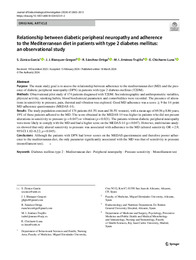Por favor, use este identificador para citar o enlazar este ítem:
https://hdl.handle.net/11000/37560Registro completo de metadatos
| Campo DC | Valor | Lengua/Idioma |
|---|---|---|
| dc.contributor.author | Zúnica García, Sara | - |
| dc.contributor.author | Blanquer Gregori, José Javier | - |
| dc.contributor.author | Sanchez-Ortiga, Ruth | - |
| dc.contributor.author | Jiménez-Trujillo, Isabel | - |
| dc.contributor.author | Chicharro-Luna, Esther | - |
| dc.contributor.other | Departamentos de la UMH::Ciencias del Comportamiento y salud | es_ES |
| dc.date.accessioned | 2025-09-29T11:11:06Z | - |
| dc.date.available | 2025-09-29T11:11:06Z | - |
| dc.date.created | 2024-03 | - |
| dc.identifier.citation | Journal of Endocrinological Investigation, 47(10), 2603-2613 - March 2024 | es_ES |
| dc.identifier.issn | 1720-8386 | - |
| dc.identifier.issn | 0391-4097 | - |
| dc.identifier.uri | https://hdl.handle.net/11000/37560 | - |
| dc.description.abstract | Purpose The main study goal is to assess the relationship between adherence to the mediterranean diet (MD) and the presence of diabetic peripheral neuropathy (DPN) in patients with type 2 diabetes mellitus (T2DM). Methods Observational pilot study of 174 patients diagnosed with T2DM. Sociodemographic and anthropometric variables, physical activity, smoking habits, blood biochemical parameters and comorbidities were recorded. The presence of alterations in sensitivity to pressure, pain, thermal and vibration was explored. Good MD adherence was a score ≥ 9 the 14-point MD adherence questionnaire (MEDAS-14). Results The study population consisted of 174 patients (61.5% men and 38.5% women), with a mean age of 69.56 ± 8.86 years; 19% of these patients adhered to the MD. The score obtained in the MEDAS-14 was higher in patients who did not present alterations in sensitivity to pressure (p = 0.047) or vibration (p = 0.021). The patients without diabetic peripheral neuropathy were more likely to comply with the MD and had a higher score on the MEDAS-14 (p = 0.047). However, multivariate analysis showed that only altered sensitivity to pressure was associated with adherence to the MD (altered sensitivity OR = 2.9; 95%CI 1.02–8.22; p = 0.045). Conclusions Although the patients with DPN had lower scores on the MEDAS questionnaire and therefore poorer adherence to the mediterranean diet, the only parameter significantly associated with the MD was that of sensitivity to pressure (monofilament test). | es_ES |
| dc.format | application/pdf | es_ES |
| dc.format.extent | 11 | es_ES |
| dc.language.iso | eng | es_ES |
| dc.publisher | Springer | es_ES |
| dc.rights | info:eu-repo/semantics/openAccess | es_ES |
| dc.rights | Attribution-NonCommercial-NoDerivatives 4.0 Internacional | * |
| dc.rights.uri | http://creativecommons.org/licenses/by-nc-nd/4.0/ | * |
| dc.subject | Diabetes mellitus type 2 | es_ES |
| dc.subject | Mediterranean diet | es_ES |
| dc.subject | Peripheral neuropathy | es_ES |
| dc.subject | Pressure sensitivity | es_ES |
| dc.subject | Monofilament test | es_ES |
| dc.subject.other | CDU::6 - Ciencias aplicadas::61 - Medicina | es_ES |
| dc.title | Relationship between diabetic peripheral neuropathy and adherence to the Mediterranean diet in patients with type 2 diabetes mellitus: an observational study | es_ES |
| dc.type | info:eu-repo/semantics/article | es_ES |
| dc.relation.publisherversion | https://doi.org/10.1007/s40618-024-02341-2 | es_ES |

Ver/Abrir:
Relationship between diabetic peripheral neuropathy and adherence to the Mediterranean diet in patients with type 2 diabetes mellitus an observational study.pdf
695,11 kB
Adobe PDF
Compartir:
 La licencia se describe como: Atribución-NonComercial-NoDerivada 4.0 Internacional.
La licencia se describe como: Atribución-NonComercial-NoDerivada 4.0 Internacional.
.png)